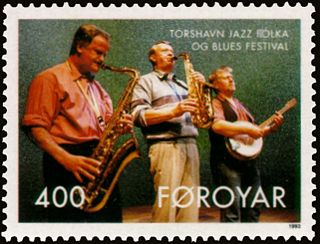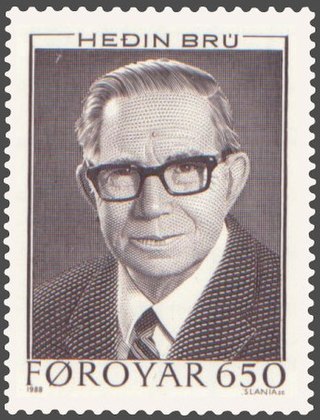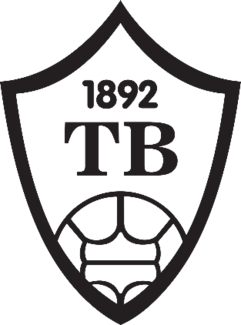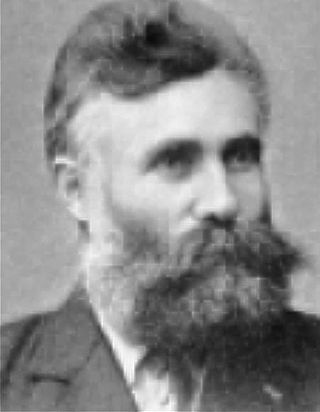
Faroese music is primarily vocal, accompanied by the fiddle and European dances like the minuet and polka. During the twentieth century choirs have played an important role in the musical history of the Faroes, and some of the best known current choirs are Tarira, Havnarkórið, Tórshavnar Manskór, Ljómur, Fuglafjarðar Gentukór, and the choirs situated in Copenhagen: Húsakórið and Mpiri.
Yggdrasil is a Nordic music ensemble based in the Faroe Islands. The band was formed in 1981 by the composer and pianist Kristian Blak, who has written most of the material for the group. From the very beginning, Yggdrasil has included musicians from other countries, having varied musical backgrounds, mainly in jazz, but also in ethnic, folk, rock and classical music.

Andreas William Heinesen was a poet, novel writer, short story writer, children's book writer, composer and painter from the Faroe Islands.

Faroese literature, in the traditional sense of the word, has only really developed in the past two hundred years. This is mainly because of the islands' isolation, and also because the Faroese language was not written down in a standardised format until 1890. Until then the Danish language was encouraged at the expense of Faroese. Nevertheless, the Faroese language soon became a vehicle for literature in its own right and has produced writers in several genres.

Heðin Brú was the pen-name of Hans Jacob Jacobsen, a Faroese novelist and translator.

Christian Matras was a Faroese poet and academic. He was the founding professor of the University of the Faroe Islands. He is one of the most important poets in Faroese literature.

Jørgen-Frantz Jacobsen was a Faroese writer. He has a distinct place in Scandinavian literature, as he is the only Faroese writer to achieve international best-seller status. This status derives from his sole novel, Barbara: Roman, which has the added cachet of being one of the few Scandinavian novels to be translated twice into English within the space of fifty years. The novel was translated into five other languages shortly after the first edition in the Danish language. It was also adapted as a motion picture directed by Nils Malmros in 1997.

Listasavn Føroya is an art museum in Tórshavn, Faroe Islands for mostly permanent exhibits of Faroese arts.

Tvøroyrar Bóltfelag is a Faroese professional football club from Tvøroyri, currently playing in the Betrideildin, the top tier of Faroese football. TB Tvøroyri is the oldest football club in the Faroe Islands, and also one of the oldest in the Danish Realm, in which the Faroe Islands are a self-governing country.

Høgni Reistrup is a Faroese singer, musician, writer and scientist from Tórshavn, Faroe Islands. He is the co-writer of the book Exit Føroyar ; he wrote it together with Heri á Rógvi. The books was published in 2012 and created a major debate in the Faroe Islands and in Denmark about the problems the Faroe Islands were facing with population decline in the islands, where the biggest problems seemed to be that half of the young people who moved away to study abroad never moved back again; especially the women did not move back again. After a period of six years with negative net migration in the Faroe Islands, the country saw an increase in the population in 2014 and 2015.
Mentanarvirðisløn Landsins has been awarded by the Faroese government to Faroese writers, musicians, artists etc. since 1998. In 2004 no award was given. From 1998 to 2000 only one award was given, but in 2001 they established an additional award, half as big as the original.
Barnamentanarheiðursløn Tórshavnar býráðs is a Faroese cultural prize, which is given by the City Council of Tórshavn to a Faroese writer, artist, musician, orchestra etc. who the board wish to award for their artistic work with children. The prize was earlier called Barnabókaheiðursløn Tórshavnar býráðs, but in 2010 the rules were changed and the title of the award was changed; the word bók (book) was changed to mentan (culture) in order not to exclude people who are not writers, but still have done a great cultural work for Faroese children.

Jógvan Isaksen is a Faroese writer and literary historian. He is best known for his crime novels and for his book about Faroese literature Færøsk Litteratur. He is leader of the Faroese publication house Mentunargrunnur Studentafelagsins which has its address in the Faroe Islands, though its committee is located in Copenhagen. It publishes Faroese books and is the oldest Faroese publishing house, having been founded in 1910.
Jens Pauli Heinesen was a Faroese writer. He received the Faroese Literature Prize four times and the Faroese Cultural Prize once. From 1968 to 1975, Heinesen was president of the Association of Writers of the Faroe Islands. He wrote novels, short stories, poems, plays, a children's book, and translated books from foreign languages into Faroese.
Ebba Hentze was a Faroese writer of children's books and a poet and translator.
Association of Writers of the Faroe Islands is an association for authors and translators who write in the Faroese language. These authors live primarily in the Faroe Islands, but some of them also live in other countries. Some Faroese writers write not only in Faroese but also in Danish, but most Faroese writers write primarily in Faroese. The Faroese language is only spoken by the Faroese people of the Faroe Islands, which currently have a population of 50.000 people. The Association of Writers of the Faroe Islands was established in 1957.

Evi Tommysdóttir Tausen is a Faroese country singer. She grew up in Froðba, Faroe Islands, and Kastrup, Denmark. Both of her parents are Faroese.

Rasmus Christoffer Effersøe was a Faroese agronomist, poet, and politician.












